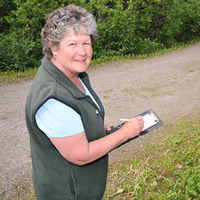What about ticks and pets?
Get the information you need to ensure your pet is protected.

The idea of something crawling up your leg in preparation for its lunch is an unpleasant thought. But that is what ticks do.
While most ticks are relatively harmless, a very few carry disease. Increasingly, ticks are a part of outdoor life. If you and your pet are outdoors walking in grass or forested areas in Western Canada you will likely be exposed to ticks at some point. Yes, you should use insect repellant with DEET, and tuck your socks in, and wear light clothing so you can spot ticks on your hiking partners. You should wear a hat. You should check yourself all over, shower before two hours are up, and become adept at removing ticks. But what about the dog?
What do I do when I find a tick on my pet?
Ticks are common in Western Canada, and recently are more common in Alberta. Alberta Health is currently monitoring ticks and asks that you submit ticks found on your person. During 2016, Alberta Health found 34 of 2,781 ticks tested carried the bacteria that causes Lyme disease. When you find a tick put it in a sealed container with the tip of a cotton swab moistened with water. This will keep the tick from drying out.
For more information visit the Alberta health website here.
Ticks found on your pet can be turned into your local veterinarian’s office for testing.
What is the best way to safely remove a tick?
The Canadian Lyme Disease website is loaded with detailed information and gives three specific ways to safely remove a tick that has attached itself.
What do veterinarians say about ticks?
RVwest recently talked with Dr. Jessica Wilson, DVM, of Mission Ridge Vet about pets and ticks.
How would you describe the incidence of ticks found on animals in Alberta?
The incidence of ticks seems to be increasing every year in Alberta. Even just 10 years ago, we were not seeing ticks on our pets and did not even think to worry about prevention.
Is this different than other provinces in Western Canada?
Alberta is much different than other Western provinces. Manitoba and parts of Saskatchewan and British Columbia have always had high numbers of ticks. Without prevention, many people find their dogs literally covered with ticks when they live or travel in these areas.
What should pet owners do to reduce the likelihood of animals being exposed to ticks?
Animals can be exposed to ticks anywhere. Obviously, the likelihood increases the deeper you are into the woods but we even find ticks on pets who only stay in the city. The best way to avoid tick bites is to use a preventive product (see below).
What should a pet owner do if they find ticks on a pet?
If you find a tick on your pet, remove it by grasping it firmly with your fingers and pulling straight out. There are also "tick spoons" which can be used to grasp and pluck a tick off your pet's skin. There is no concern with leaving the "head" of the tick under the skin. If any part of the tick is left, the immune system will take care of it. A small bump may be present for a few days. If possible, save the tick and bring it to a vet clinic in Alberta so it can be sent off for analysis. The province of Alberta will analyze the tick free of charge and let the clinic know what type of tick it was and if it carried Lyme disease.
What preventive treatments for pets are available to help manage ticks?
There are many different types of products to prevent ticks. The safest and most effective products can be purchased at veterinary clinics. There are oral products that allow the ticks to fall off once they bite the pet or there are topical products placed on the skin that prevent the tick from even biting your pet at all. Both types usually provide one month's worth of tick prevention before repeating the dose.
Recreational vehicle users spend time outdoors—that’s sort of the point. Admittedly ticks can be a nuisance but with good preventive treatments for our pets, sensible monitoring, and effective removal and testing, you and your pet should continue to actively enjoy the great outdoors.








